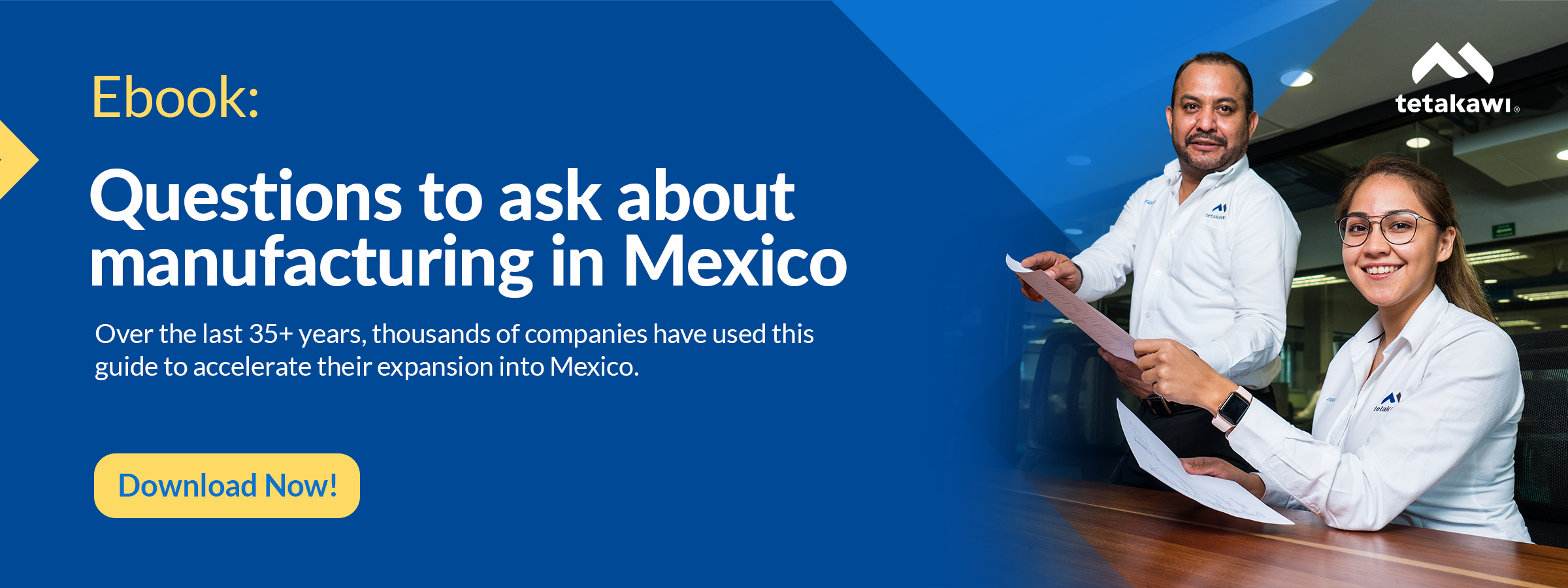The automotive industry is undergoing a major shift, and it’s being felt in factories across Mexico. As automotive OEMs prepare for the future, they’re looking for suppliers who are able to help them deliver new value to consumers. To provide this value, suppliers will need to navigate the following automotive manufacturing trends:
- More automotive companies are manufacturing in Mexico than ever.
- Suppliers are adapting to support electric vehicle production.
- Companies are meeting the increased demand for advanced materials.
- Demand for software-driven vehicles is increasing in software and manufacturer collaboration.
- Manufacturing talent is adopting new skill sets.
Below, we dive into how these trends are impacting the automotive manufacturing landscape in Mexico.
1. Massive manufacturing growth
The most noteworthy automotive manufacturing trend in Mexico today is the tremendous growth fueling this sector. The country is the seventh largest vehicle producer in the world, but the Mexican Automotive Industry Association (AMIA) projects it will rise to 5th place as soon as 2025.
Much of this growth has been the result of the implementation of the USMCA free trade agreement. The trade agreement increased the amount of North American content required for automotive importers to benefit from tax exemptions, compared to requirements in place under NAFTA. As a result, more suppliers from around the world have been incentivized to launch production in Mexico. Moreover, the U.S. International Trade Commission predicts that the full impact of this automotive manufacturing trend may not be clear until the agreement is fully implemented in 2027.
Manufacturers that make this move into Mexico today will benefit from cost advantages that can be reinvested in future growth.
2. Electric vehicle supplier support
Electric vehicle (EV) manufacturing in Mexico is increasing due to changing regulations in multiple countries, combined with growing consumer demand for EVs. Four EVs are currently made in Mexico, including Ford’s Mustang Mach-E in Cuautitlán Izcalli and the Chevrolet Blazer, Chevrolet Equinox, and Honda Prologue in Ramos Arizpe. Other OEMs are laying the ground for a similar shift. BMW Group is investing EUR $800 million in expanding its San Luis Potosí plant in order to perform high-voltage battery assembly near vehicle assembly. The company expects to start producing the Neue Klasse electric sports vehicles in the plant in 2027.
Differences between EV and conventional vehicles are pushing OEMs to build new supply chains in Mexico. The differences go beyond battery needs. For example, EV batteries are much heavier than conventional engines, and so manufacturers are looking for lighter structural materials to offset this weight. This is opening up significant opportunities for new suppliers to serve OEMs in Mexico.
3. Advanced materials production
In order to reduce vehicle weight and increase production efficiency, manufacturers are evaluating a range of new materials. Strategies like additive manufacturing, or 3D printing, are gaining traction. 3D printing has helped Audi reduce production time for certain automotive components by half. GM and Ford are reportedly using 3D-printed assembly line tooling to reduce production downtime. Suppliers are adapting to rapidly deliver the lightweight parts manufacturers want. Mexico’s additive manufacturing market is expected to reach USD $1.90 billion by 2030, reports Next Move Strategy Consulting.
In other cases, manufacturers are exploring alternative materials to meet sustainability goals. Companies like Carbon Revolution and Zoltek are increasing production of lightweight carbon materials in Mexico in order to boots vehicles’ fuel efficiency.
Companies that are prepared to meet demand for advanced materials will have a competitive edge in Mexico’s evolving automotive manufacturing market.
4. Solutions for software-driven vehicles
Software plays a more central role in the manufacture and operation of vehicles than ever before. Software-driven vehicles (SDVs) feature layers of software systems that handle both infotainment and, increasingly, the advanced driver-assistance systems that lay the groundwork for autonomous driving. This shift toward more connected software-driven vehicles will require closer collaboration between automotive OEMs and software developers.
Mexico is well prepared to meet this trend. For decades, the Mexican government has invested in software developer training to support growth in technology sectors. Guadalajara has earned the nickname “Mexico’s Silicon Valley” due to investment from global technology leaders. The country’s strength as a hotbed of software engineering talent makes it easier for automotive manufacturers to streamline the production and assembly of structural and technology components.
5. New training for manufacturing talent
Manufacturing of all types is changing through the adoption of advanced production technologies. Now, Mexico’s workforce is adapting to meet these changes, thanks to investments in training and education by private companies and governments.
For example, with its San Luis Potosí plant expansion BMW Group is also expanding skills development to prepare its workforce for EV-related processes. Training topics will explore safety issues inherent to the production of high-voltage battery systems, as well as the use of robotics in manufacturing.
In addition, the International Youth Foundation (IYF), through a public-private partnership with the National Auto Parts Industry Association, has launched the world’s first competency model for EV manufacturing in order to shape tomorrow’s talent pipeline. Based on IYF’s identification of critical skills for electric vehicle production and analysis of the availability of these skills in various labor pools, IYF is launching a new public school curriculum to prepare the future workforce.
The variety of in-house and in-school training opportunities like these are positioning Mexico’s skilled labor force to serve manufacturers as they embrace new technologies and production processes.
Automotive manufacturing location trends
As automotive manufacturers reevaluate their manufacturing strategies, they’re also reevaluating their manufacturing footprint. The shifts across the automotive sector are driving decisions about where to expand and where to consolidate. Many suppliers are considering the following locations for supporting OEMs:
- Hermosillo: This economic center of northwestern Mexico has deep roots in automotive manufacturing. The city offers proximity to the Ford Stamping and Assembly plant and the U.S. market. Manufacturers here have access to a wealth of resources, including a highly skilled workforce, and robust supplier network. Companies can also enjoy these advantages from a nearby location in Empalme or Guaymas, part of the nearby network of manufacturing cities within Sonora.
- Saltillo: The "Detroit of Mexico" provides automotive suppliers proximity to the Stellantis and General Motors' plants. These manufacturers have already embraced electric vehicle production and are helping to shape a highly skilled automotive workforce.
- Mazatlán: This emerging manufacturing city offers an alternative to northern Mexico’s highly competitive manufacturing ecosystem. Companies investing in this western Mexico location gain strategic options for export and an opportunity to shape the untapped manufacturing labor pool.
FAQ: How can my company take advantage of automotive manufacturing trends in Mexico?
A: To fully leverage the growing opportunities in Mexico's automotive sector, follow these steps:
-
Determine the right mode of entry
Consider your company’s goals and the resources available when choosing how to enter the Mexican market. Popular options include:- Shelter services: A cost-effective, low-risk way to start production in Mexico without needing to establish a legal entity, allowing you to focus solely on manufacturing.
- Standalone operation: Establishing your own entity for complete control over operations but requiring higher investment and local expertise.
- Joint venture (JV) or acquisition: Partnering with or acquiring an existing local company can help you quickly scale operations, leverage local market knowledge, and access established supply chains.
-
Identify the right location for your operations
Mexico offers key manufacturing hubs such as Hermosillo, Saltillo, and Mazatlán, each with strategic advantages based on proximity to OEMs, access to skilled labor, and infrastructure for export. Evaluate which region best supports your manufacturing needs, whether it’s EV production, proximity to suppliers, or logistics advantages for export. -
Develop relationships with local suppliers
As automotive manufacturing shifts towards electric vehicles and advanced materials, forming strong partnerships with local suppliers is essential. Mexico’s growing supply chain includes cutting-edge providers of lightweight materials, battery components, and 3D printing, offering companies a competitive advantage in the fast-evolving industry. -
Leverage Mexico’s skilled labor force
Mexico’s workforce is rapidly adapting to modern manufacturing needs. With extensive investments in training programs for EV production, robotics, and software-driven vehicles, companies can tap into a well-prepared labor force to support their production goals. Take advantage of programs offered by government and private institutions to secure a highly skilled team. -
Utilize trade agreements and incentives
The USMCA offers significant benefits for companies that manufacture in Mexico, such as favorable tariffs and tax exemptions. By sourcing components locally or from North America, manufacturers can reduce costs while complying with the agreement’s content requirements, leading to greater profitability and competitiveness.
Conclusion
Not sure how to best take advantage of the growing automotive manufacturing trends in Mexico? This is where having a trusted partner can make all the difference. Tetakawi has over three decades of experience in helping automotive manufacturers successfully launch and scale their operations in Mexico. Whether you're exploring electric vehicle production, advanced materials, or new supply chains, Tetakawi’s expertise ensures that you can navigate this evolving landscape with confidence.
If you’re ready to lead the way in Mexico’s automotive industry, contact Tetakawi today to learn how we can support your success.
Subscribe
Sign up and stay informed with tips, updates, and best practices for manufacturing in Mexico.






